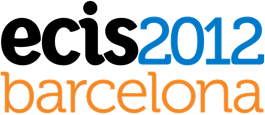Barcelona on June 10-13, 2012ESADE, Barcelona, Spain



the 20th European Conference on Information Systems



the 20th European Conference on Information Systems
Kai Riemer The University of Sydney Business School kai.riemer@sydney.edu.au
Stefan Seidel University of Liechtenstein stefan.seidel@hochschule.li
Mary-Beth Watson-Manheim University of Illinois at Chicago mbwm@uic.edu
Collaboration has long been a domain of interest for the Information Systems Discipline, be it in the form of collaborative systems, group decision support, or more general the application of information systems in collaborative structures such as virtual teams. More recently however, the topic has received renewed attention from both the general public and the academic community due to the emergence and increasing popularity of social computing services. Unlike traditional groupware, as part of the Web 2.0 evolution, social computing originates from the public Internet. Here, various social media platforms and social technologies facilitate collaborative phenomena such as knowledge sharing (Wikipedia, Flickr etc.), social networking (Facebook, LinkedIn etc.), awareness creation (Twitter, Foursquare etc.), or text-centered collaboration using platforms such as Dropbox or Google Docs. The collective production and sharing of digital goods of various types emerges as the backbone for a new type of shared services, which yields potentials for business application, global societal change and the greater common good.
At the same time, spurred by the success in the public space, social computing makes inroads to organizations. This raises a plethora of research questions with regards to applicability, implementation, usefulness, adoption and appropriation, interaction with other technologies, and impact for organizational change. Quite obviously, social computing is intimately connected to the ICT enablement of collaboration in organizations.
The aim of this track is to bridge the gap between the emergent discussion around social computing and social media on the one hand, and the more established IS- and IT-related research on ICT-enabled communication and collaboration on the other. It intends to provide thought leaders with a forum that accounts for the many topics related to collaboration and social computing. Examples include usability, accessibility, and reach of social computing for collaborative work as well as the impact of social computing on various kinds of collaborative processes, for instance, software development, new product development, work in the creative industries and innovation or the production of public goods. In particular, we encourage researchers from both areas to draw from each other: to apply established IS theories and approaches to the newly emerging phenomena, to develop new foundational theory, to revisit old problems in the face of new approaches, in short to expose innovative ways of using and managing social computing for collaborative endeavors.
We invite rigorous and relevant studies employing a wide range of methods applying a distinct Information Systems perspective; we especially welcome method-triangulating contributions. Empirical (interpretivist and positivist) studies as well as design-oriented research and conceptual papers facilitating theory development will be considered.